Callisto
[ + link to: Thanator - For and Against - What to see on Callisto ]
The outermost of the four big satellites of Jupiter, Callisto has
attracted its share of literary visitors.

But for starters I can't resist showing some artwork - the Frank R Paul painting, probably the most frequently reproduced of all his pictures, of Serenis, Water City of Callisto, with its caption "The Callistans love beauty..."
In the literature of the Old Solar System, Callisto features in many intriguing short references, "scraps", one-liners, such as Lovecraft's "insect philosophers" in Beyond the Wall of Sleep.
Harlei: Hey, listen, I can link that - overlap it - Venn-diagram it with another "invertebrates-on-Callisto" reference that's actually more than just a "scrap": it's an entire story: The Callistan Menace. In that tale, the "Magnet Worms" -
Zendexor: Ah yes, an "Early Asimov", in the collection of that name. Don't give the story away. Let's just quote the enticing approach it gives us - the approach to a world seen freshly, newly, as we can never do in our less adventurous reality in which space probes have done our reconnoitering for us:
the first wondering look
And as the days passed, the pale blue circle that was Callisto grew upon the visiplate until it took up most of the sky...
We dived - in a long, gradually contracting spiral. By this maneuvre, the Captain had hoped to gain some preliminary knowledge of the nature of the planet and its inhabitants, but the information gained was almost entirely negative. The large percentage of carbon dioxide present in the thin, cold atmosphere was congenial to plant life, so that vegetation was plentiful and diversified. However, the three per cent oxygen content seemed to preclude the possibility of any animal life, other than the simplest and most sluggish species. Nor was there any evidence at all of cities or artificial structures of any kind...
Those were the days, eh? When it was left to spacefarers "on the spot" to discover whether a Solar System world had life...
Harlei: Not that "life" is the be-all and end-all. Our own Moon, even if barren and sterile, has personality, well worth exploring. The Old Space Program -
Zendexor: Yes, yes - a valid point. Conversely you could have a biosphere without personality. Some nameless interstellar planet, carelessly portrayed... But our Old Solar System gives writers a head start. As it were on the letter-heading of each world, even before a writer has typed the first word of his tale on it, personality is already provided. Callisto, therefore, even though it's not a planet, has the potential - possessed by any moon-sized world as well as by any planet in our System - the potential, the latent mythic power, which derives from its place in a select few: those orbs, each with their own uniqueness, who are numbered among our Sun's vari-hued family.
a callistan sword-and-planet saga
How far, then, has this potential been realized in literature? That - as usual - is the question we must ask: how good a job have writers made of doing justice to the world we're talking about - in this case, Callisto.
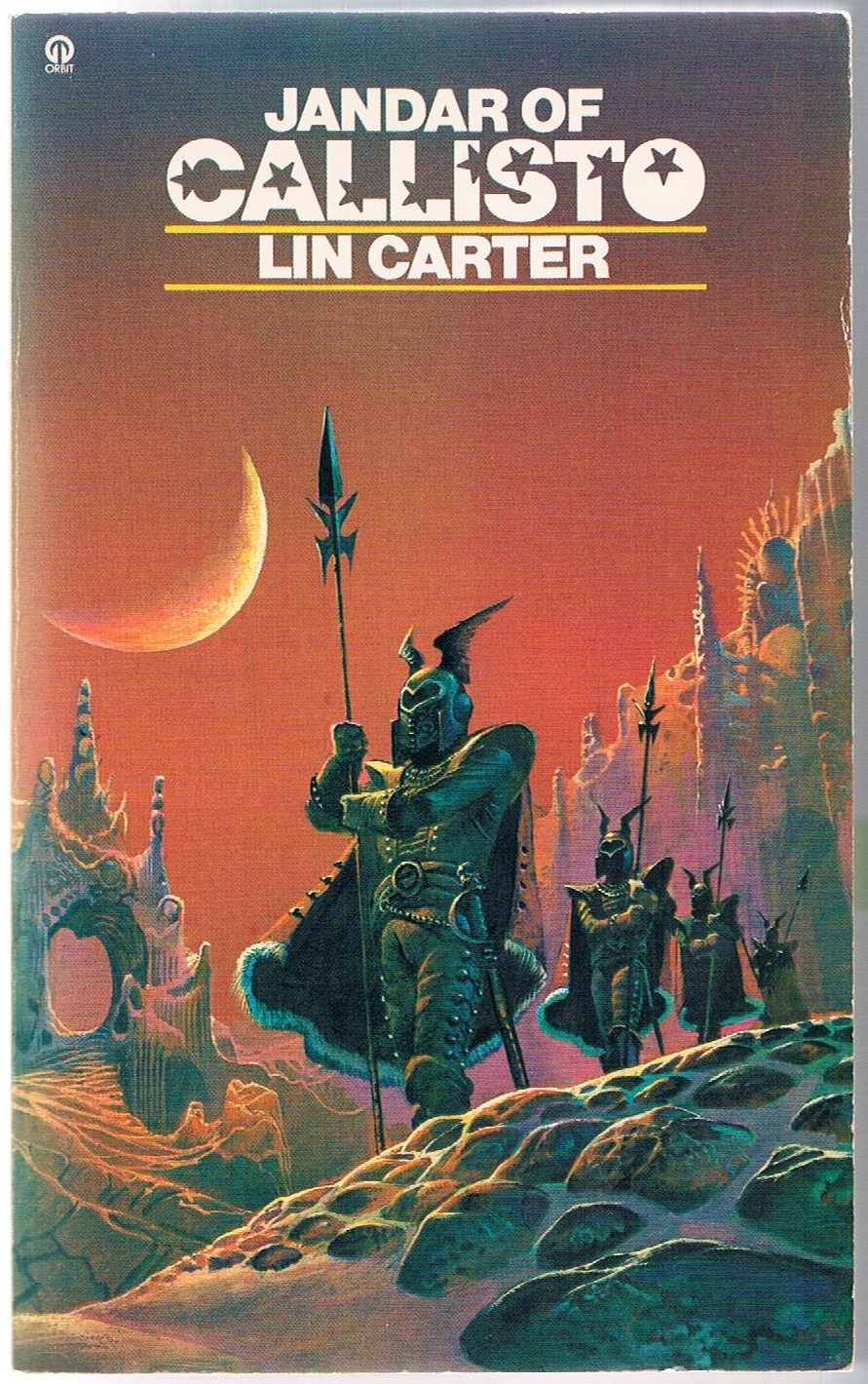
Harlei: We're in luck with this particular moon! There's a whole series of Barsoom-style planetary adventure available -
Stid: Barsoom-style is too right. The Jandar of Callisto series is a mere pastiche, missing some of ERB's merits, and including all his faults. That's the impression I get -
Harlei: The impression you get from dipping in, I'll bet. Riffling through, picking out a paragraph here and there.
Stid: You do me an injustice. I have read quite a bit of it, the first three volumes as a matter of fact, and I read them properly because I'm interested in this pastiche business; technically, psychologically interested. I want to know how far it can ever be made to work. Key question, eh, Zendexor?
Harlei: Yes, Zendexor, you had better decide whether the bottle's half full or half empty. Stid could bear to read the first three volumes, but not the next five.
Zendexor: Ah, now you're both turning to me, as to an umpire. We need to get down to brass tacks...
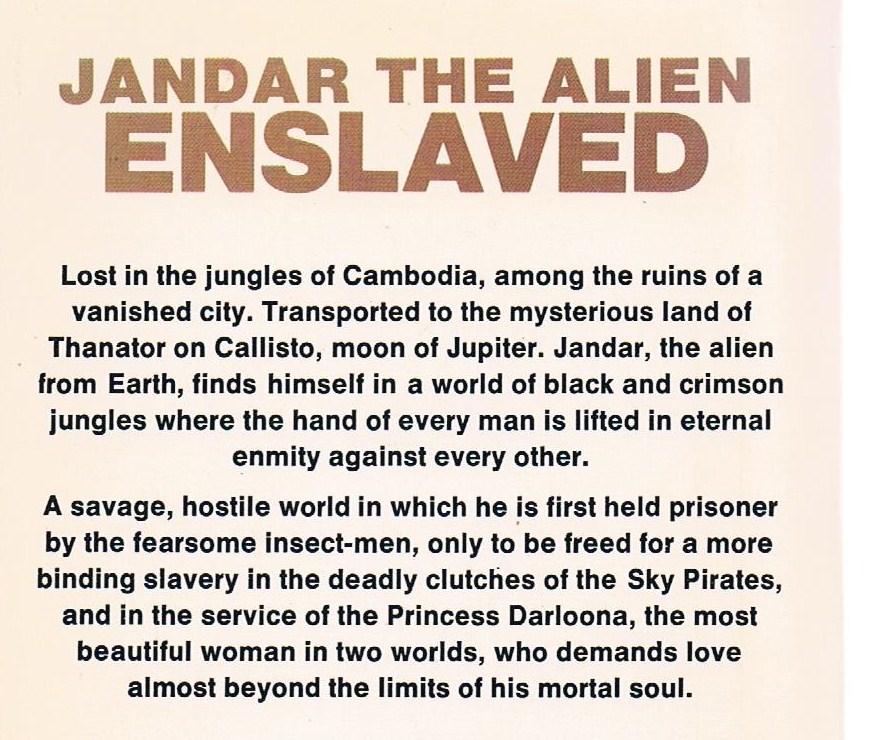
Stid: Brass clichés, more like.
Zendexor: That's question-begging. Archetypes, themes, tropes, traditions, clichés - they're all to do with sharing ideas between stories. Call it a cliché if you don't like it, an archetype if you do...
Success is everything, and the question then is, how successful is Jandar of Callisto? Does one finish it with a sigh of satisfaction and a pleasant anticipation of the sequel? If we compare that first volume of the Callisto series with ERB's A Princess of Mars, I don't think that Jandar comes off at all badly.
For starters, let me mention one department in which both books are excellent: the introductory chapters, scenes set on Earth before the hero gets transported to his destined planet.
John Carter, prospecting in the Arizona hills, and Jonathan Dark, flying medical missions in South-East Asia and then being marooned in the jungles of Cambodia after a helicopter crash - both narratives are handled every bit as well as any reader is entitled to expect.
I paused from time to time to listen. No sound of diesel engines, no guttural Viet Cong voices, no chatter of radio static. Just the slap and wash of the river against the reedy shore, the rustle of small things sliding through the leaves, the thousand little ordinary sounds of the jungle.
Stid: It's all right till he finds the ruined city. Then the rhetorical flourishes come thick and fast.

Time hung heavy here; its invisible weight pressed on my soul. There was an almost palpable aura of immense and unbelievable antiquity that hung about these moldering ruins from time's dawn. I felt the shudder of superstitious awe go through me. It was as if I walked through a shadowy necropolis where gods themselves lay buried; as if with every step I risked awakening mummified wizards or unseen guardians who had slumbered the ages away, and into whose time-haunted precincts mine was the first intruder's step.
Zendexor: All right, so you think he lays it on a bit thick at that point. In my view the passage is fine if you happen to be in the mood, but I agree that Captain Dark can get verbose sometimes. You need to make allowances for the fact that he is not a literary man. He's a man of action, and so he piles on the adjectives as if they were sword-strokes. If you're generous, you'll make that excuse for him. You could even use the excuse to applaud the narrator's tone for being convincingly "in character".
Stid: You should have been a lawyer, Zendexor.
Harlei: That's what he is - a street lawyer defending the oppressed. That's to say, defending planetary adventure stories against their oppressors, the lit crit tendency.
Zendexor: Living up to that - thank you, Harlei - I continue with my list of good things to say about Jandar of Callisto.
Jonathan Dark, alias "Jandar", gets to Callisto in slightly less arbitrary fashion than John Carter gets to Mars. There's the same sudden naked and instantaneous crossing of space, but at least the author of Jandar bothers to include an actual matter transmitter, the Gate Between the Worlds in the lost city of Arangkôr.
True, he doesn't bother to give us any indication as to why there should be such a "Gate" there.
But Burroughs gives us far less; gives us absolutely nothing, in fact, to help understand how or why John Carter should find himself suddenly on Mars. Or course this demonstrates Burroughs' confidence, his inspired madness, as a writer, but though he gets away with it, I prefer the risk not to be run - the risk that a lack of boundaries or limitations will undermine all interest in any future predicaments in which the hero may find himself.
Anyhow, Captain Dark finds himself on Callisto, and here I must mention another plus point.
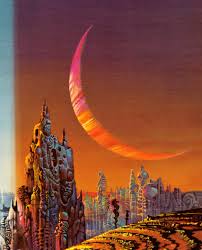
Callisto ("Thanator" to its inhabitants) is no mere clone of Barsoom. Physically, it's a nicely imagined world with a character of its own. Its fluorescent skies of twisting golden vapours, its black-and-crimson jungles, are memorably described. The Sky Pirates of Zanadar, with their gas-and-paper ornithopters, are nicely conceived, and have no equivalent in the Barsoom books.
The emotionless Yathoon Horde of insect-men do match closely in a number of respects with the dour nomadic Tharks and Warhoons of Burroughs' Mars - though the Yathoons are less cruel than the green men of Barsoom. (Note the invertebrate/insect theme recurring - remember we noted it at the beginning of this page, with regard to the Lovecraft and Asimov views of Callisto.)
The parallels between the two world-concepts of Thanator and Barsoom are close here. It's easy to match the role in the plot played by the Yathoons in Jandar with that of the Tharks in A Princess of Mars. Jandar starts off by being captured by the Yathoons as John Carter is by the Tharks; Jandar is educated by, and befriends, Koja the Yathoon chief, echoing the relations between Carter and Tars Tarkas. And Jandar first gets to know the heroine, Princess Darloona, when she becomes his fellow-captive, just as Carter first sees Dejah Thoris when she falls among the green men.
Stid: Almost plagiarism.
Zendexor: It's an efficient enough plot-pattern in its way. Bound to be used again and again. Re-use needn't spoil it if the writing hits the right tone.
But next let me talk about Darloona herself, and her relations with Jandar, and what all this reveals about Jandar himself -
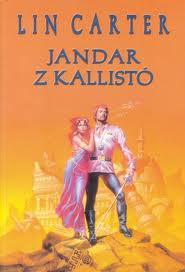 looks more like Flandry
looks more like FlandryStid: I can tell you what it reveals - more copycat cliché! The rocky road to love between Darloona and Jandar is just another bit of too-obvious parallelism with John Carter / Dejah Thoris. In each case, misunderstanding separates them when the bloke, in his ignorance of the planet's customs, says something to offend the girl, and it only comes right several captures and rescues later.
Zendexor: It's not the same. Dejah Thoris gets offended by John Carter; Darloona gets offended by Jandar - but - Dejah is at most hurt and indignant, while Darloona, on the other hand, really seems to despise Jandar during much of the book.
And as for Jandar himself, he means well, as John Carter does, but does not attain Carter's dignity. On the contrary, Jandar is seriously humiliated by one of his enemies, a thing which would never happen to John Carter.
So far, I've made positive points. If I were briefed to attack the book, I could make plenty of negative points too; and just to prove I haven't lost these black arts, let me lodge a destructive complaint about Jandar of Callisto.
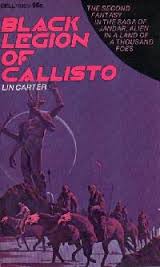
The narrator is subject to fits of arch over-dramatisation.
The worst instance is at the end of the book when he sees that Darloona ride into her city of Shondakor as a captive of the Black Legion.
Jandar might have said, "oh darn it, the baddies have got her, now what the heck am I supposed to do" - or better words to that effect.
Instead of which, he goes into lament-mode for the next seven pages or so without even telling the reader what has upset him. After starting off with
...the sight upon which we stared in grim silence was more terrible than words can express.
I shall never exorcise from my memory the profound horror of what I saw as we stepped through the fringes of the jungle and stared at that which lay before us on the broad plain under the golden skies of morn...
- he then broods on for four more pages about how he can never go home with such unfinished business on hand. Then:
Hopelessly, my comrades and I turned aside from the sight that we had seen...
What sight, though? He still doesn't get to the point.
A page later:
Never shall I forget that terrible moment when, with Koja and Lukor at my side, I peered through the edges of the jungle and looked upon a broad and fertile plain in whose midst arose the mighty ramparts of a walled city of stone.
That's Shondakor, Darloona's city - but there's still no word of what makes the terrible moment terrible.
Finally, yet another page further on, he does get round to telling us that the Black Legion has got the Princess in their clutches.
And I watched hopelessly as the woman I suddenly knew I loved more than my life itself was borne, a helpless captive, into the gates of the very stronghold of her deadliest enemies!
Well, dag nabbit, I should have thought that this had been on the cards for quite some time, considering that we'd already been told that the Black Legion was in possession of Shondakor.
Harlei: And now, Mr Lawyer Zendexor, suppose I hire you to defend instead of attack? Switch briefs!
Zendexor: Right-oh, here goes. Just as, if you go to see a pantomime, you're supposed to get into the spirit of the thing, and shout "Oh yes it is!" and "Oh no it isn't!" where appropriate, so when reading stuff like Jandar of Callisto you're supposed to follow the windings of the gee-whiz emotion-trail.
So, if you're told that something is a profound horror, then give it a proper shudder. And so on.
It all depends, of course, on whether the book is worth it. After due consideration, I give Jandar (volume one, at any rate) the thumbs-up.
exploring the unknown hemisphere
As for the rest of it - well, it's slow, slow! But I do value the moment of discovery in the fifth volume, Mind Wizards of Callisto, when Jandar in his skyship crosses a frontier of longitude and enters the far side of his adopted world, just before dawn breaks.
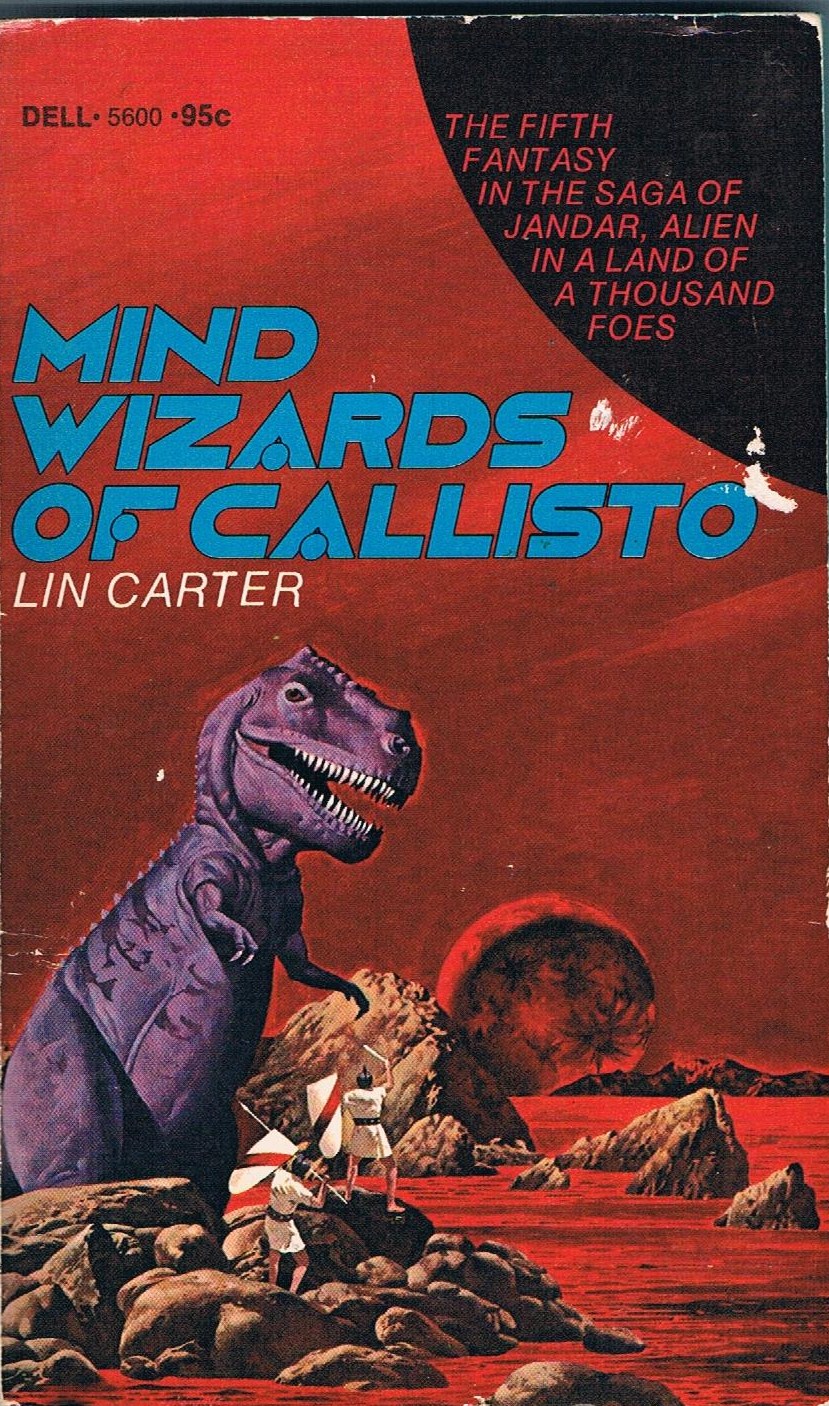
...I woke suddenly and sat bolt upright in my bed, aware of a stirring of inward excitement I could not at first account for. Then, looking at the dimly-burning time-candle in its glass bottle across the cabin, and counting the carefully-measured rings painted thereon, I became cognizant of the time, which was about four A.M., and realized with a thrill what had awakened me. It had been my subconscious, which had evidently been counting the hours away. We had by this hour covered two hundred and thirty-seven korads.
That was making good time. But we were making more than just good time - we were making history!
For, at about the moment I had awakened from my slumbers, we had flown beyond the eastern limits of the map of Callisto.
We had, in fact, just flown over the edge of the world...
----------------------------
Dawn broke like an immense, soundless explosion, filling the skies of Callisto with clear, brilliant, sourceless golden light.
The event which had transpired shortly before was too momentous to permit me to resume my interrupted slumbers. I rose, threw on my plain leathern tunic and boots, buckled the heavy girdle about my midsection, and slipped my baldric over my shoulders so that my rapier hung in its scabbard at my left hip. Then, because the winds of morning were likely to be chilly at this height, I drew about my shoulders the folds of a heavy cloak of dark wool and left my cabin, ascending the narrow, winding stair to the observation belvedere atop the pilothouse.
Peering over the carven balustrade, I had my first glimpse of an unknown world.
The landscape below was dim with morning mist, but I discerned the level plain stretching beneath us, and could make out the dark, shaggy rondure of wooded hills. Far away on the gloomy horizon a river or lake glittered fierce silver.
Nowhere could be descried a hilltop castle, town, city, paven road or cultivated field. Nothing in view suggested that this nameless land was inhabited by men...
Good enough, for a first look. Alas, it is hardly any time at all before the expedition gets bogged down, and the narrative with it. To me at any rate, the last five books in the series seem to drag. However, since I am not fully satisfied with this negative judgement, I shall (I hope) some time get round to devoting a page to further study of the Thanator series.
On the one hand I don't want to "erode differentials" and do injustice to really good books by over-praising the less good, thus perhaps mis-directing the attention of readers away from the better towards the worse; on the other hand I am sorely tempted to give Thanator as good a chance as I can, since the prize is so great for any OSS fan - a whole series of eight books about an inhabited Callisto!!
For more on the Jandar series, see Thanator - For and Against.
callistan cars
Harlei: Tell me one thing. Is there a great, exciting civilization on the far side of Thanator/Callisto?
Zendexor: I'm afraid I can't tell you of any really impressive Callistan civilization in any book anywhere. Not that I've found so far, at any rate. Not one that is written up well enough, anyhow. There's quite a potentially interesting urban Callisto in the Penton and Blake tale, The Immortality Seekers. But most of that is so poorly written, it's hard for me to follow. I have to rummage in it for those few scraps which come alive, or partly alive.
"...Did you get the layout of the city?"
"Yes. It's a harbor city on an inland sea, more of a huge salt lake. The harbor is something like San Francisco on a miniature scale. Shaped like a Greek capital omego. We're on the left headland, in the governmental buildings, surrounded by nice, broad, orange parks. We'd be as conspicuous as a pair of zebras walking down Fifth Avenue... The ship's at the airport on the opposite headland. The only way I can see to get there is to cross those parks, with their bright orange grass, in full daylight, and somehow get among those warehouses and docks along the waterfront.
"From there, we'd have to steal a car..."
Now, this leads to something interesting at last. Still in a style that makes my eyeballs skid around as I try to read it, but - interesting.
"...That, my boy, is not an engine. That is an animal, a nice, synthetic animal."
"Animal! A six-cylinder animal? With a gear-box and ignition system?"
"No, a six-muscled animal. The supercharger is not a supercharger; it's a blower, a mechanical lung. The fuel tank contains not gasoline, but a sugar solution. I tasted it. The ignition system, on the other hand, is made up of synthetic nervous tissue, and a few, miniature electric cells for stimulation. Muscles, my friend, don't need a high oxygen concentration; they repair themselves, renew themselves, and grow stronger with use.
"I didn't have time to look, but I suspect that the animal engine also has a series of synthetic kidneys to remove waste products, and probably some oil-secreting cells, like the oil glands in your elbow, to supply lubrication. Six muscles pulling on tendons connected to a slip-ring - probably made of non-poisoning silver - a metal crankshaft geared direct to the wheels..."
Now what we need is some tale to bring the material we have into harmony, to link the urban with the rural Callisto, into a wondrous, character-filled vision like that of the Frank R Paul picture.
Doubtless, we readers are already doing it in our minds, but the vision flickers about, as yet insubstantial.
Isaac Asimov, "The Callistan Menace" (Astounding Stories, April 1940; reprinted in The Early Asimov (1972)); Edgar Rice Burroughs, A Princess of Mars (1912, 1917); John W Campbell, "The Immortality Seekers" (Thrilling Wonder Stories, October 1937); Lin Carter, Jandar of Callisto (1972) and its 7 sequels, including Mind Wizards of Callisto (1975); H P Lovecraft, "Beyond the Wall of Sleep" (written in 1919 and published that year in the amateur publication Pine Cones)
For "cat-men" of Callisto see The Halfling by Leigh Brackett - the "carnival" story discussed in Rich OSS Background for an Earth Tale.
For the ice-spires of Callisto see Nature makes amends.





























